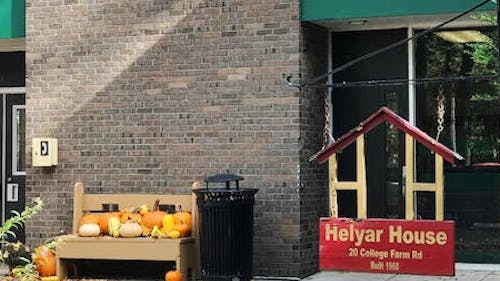Historic house on Cook allows students to exchange labor for lower rent

With tuition and living cost expenses increasing every year, many students might find themselves struggling to make ends meet.
According to the Rutgers housing website, on-campus living can soar as high as over $13,000 for a year. This leaves some students with no option but to either commute, take out massive student loans or drop out.
The Helyar House is a residential house on campus that gives financially handicapped students in the School of Environmental and Biological Sciences a special opportunity to live on campus at a reduced living cost.
The idea of this living space arose in the 1930s when many students were struggling to finance their living expenses at Rutgers and started doing odd jobs around campus to support themselves. The farm located on Cook campus created many work opportunities, such as cleaning the stables and feeding and caring for the animals.
Agriculture Professor Frank Helyar saw the situation as an opportunity to give students room and board in exchange for their labor on the farm and maintenance of the house.
The house was later named the Helyar House in honor of Helyar. Since then, it has become a distinctive, community-driven residence hall on campus.
“It’s a unique opportunity. It’s very different from normal student housing,” said Joseph Ventola, a member of the advisory board of the School of Environmental and Biological Sciences.
It is a high corporate living environment for students with high financial needs, Ventola said. Students work together to sustain the house themselves by sharing cooking and cleaning responsibilities.
In exchange, they save over $3,000 on tuition and over $5,000 on housing and meal plans, totaling to over $8,000 deducted from their term bill, according to the School of Environmental and Biological Sciences website.
Even though it is primarily student run, there are resident assistants, a house president and counselors on site to oversee the functions of the house.
“Helyar House is supervised and staffed by a Rutgers resident counselor, and students abide by the rules and regulations of Rutgers housing," according to the School of Environmental and Biological Sciences website.
This style of housing tradition at Rutgers was officially established in 1968 and has been successful since. There are 40 students residing there, and 12 new students are accepted every school year. Students of any year within the School of Environmental and Biological Sciences can apply, according to the website.
During their time there, these School of Environmental and Biological Sciences students have the opportunity to engage in the work around the farm and to learn more about their field of study. There is a greenhouse and a chicken coop on the farm that students are encouraged to visit, Ventola said.
In addition to taking on chore responsibilities, residents are required to partake in a given number of hours of community service during their first two years of residency. In their last two years, they are required to do an internship in their field of study that will prepare them for post-graduation.
The Helyar House will be celebrating its 50-year anniversary on Sept. 22, 2018. Ventola said there will be a big celebration where the alumni will come back to honor the house.
“The alumni go on (to) be very successful," Ventola said.
Because it is such a strong community-driven, self-governing living environment, residents there learn extraordinary interpersonal and communication skills they can use after graduation in real-world experiences, said Helyar House's Residence Life Coordinator John Leciejewsk.
“They get a chance to learn a lot of conflict resolution and leadership skills and get a chance to be a member of the Rutgers community without being burdened financially,” he said.



